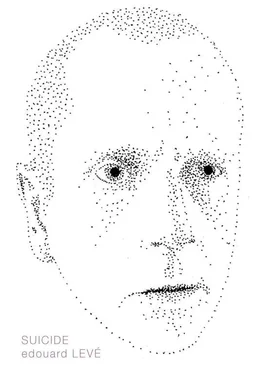Édouard Levé - Suicide
Здесь есть возможность читать онлайн «Édouard Levé - Suicide» весь текст электронной книги совершенно бесплатно (целиком полную версию без сокращений). В некоторых случаях можно слушать аудио, скачать через торрент в формате fb2 и присутствует краткое содержание. Город: Lonton, Год выпуска: 2011, ISBN: 2011, Издательство: Dalkey Archive Press, Жанр: Современная проза, на английском языке. Описание произведения, (предисловие) а так же отзывы посетителей доступны на портале библиотеки ЛибКат.
- Название:Suicide
- Автор:
- Издательство:Dalkey Archive Press
- Жанр:
- Год:2011
- Город:Lonton
- ISBN:978-1-56478-628-9
- Рейтинг книги:3 / 5. Голосов: 1
-
Избранное:Добавить в избранное
- Отзывы:
-
Ваша оценка:
- 60
- 1
- 2
- 3
- 4
- 5
Suicide: краткое содержание, описание и аннотация
Предлагаем к чтению аннотацию, описание, краткое содержание или предисловие (зависит от того, что написал сам автор книги «Suicide»). Если вы не нашли необходимую информацию о книге — напишите в комментариях, мы постараемся отыскать её.
, just a few days before he took his own life.
Suicide
Suicide
Suicide — читать онлайн бесплатно полную книгу (весь текст) целиком
Ниже представлен текст книги, разбитый по страницам. Система сохранения места последней прочитанной страницы, позволяет с удобством читать онлайн бесплатно книгу «Suicide», без необходимости каждый раз заново искать на чём Вы остановились. Поставьте закладку, и сможете в любой момент перейти на страницу, на которой закончили чтение.
Интервал:
Закладка:
You dreaded the boredom of being alone, as well as the boredom of being with several people. But most of all you dreaded two-person boredom, the face-to-face. You attributed no virtue whatsoever to moments of waiting, moments without anything perceptible at stake. You believed that only action and thought, which seemed absent here, carry life. You underestimated the value of passivity, which is not the art of pleasing but of placing oneself. Being in the right place at the right time requires accepting long moments of boredom, passed in gray spaces. Your impatience deprived you of the art of succeeding by being bored.
It was eight in the evening when you arrived with your wife at Christophe’s garden for a barbeque with friends you knew during high school. You hadn’t kept up contact with anyone from that era except for him. You no longer socialized with any of the people reunited this evening, but, thinking back on them the night before, you were excited by the memories that came back to you. You thought that seeing them again would reunite past years and the future prospect of seeing them, in the present.
There were, in this big bourgeois house in the middle of town, a dozen couples. The girls and boys of your adolescence had come with their companions. They were now adults; some of them were accompanied by their children. You looked at their faces and appreciated the strange impression of seeing the memories you had of them superimposed upon their current faces, as in films, one body transforming into another in a few seconds. But, as you watched, today’s faces didn’t manage to efface the old ones imprinted in your memory. You would no doubt have needed to see these people for some time in order for the present to replace the past, and for your mental identity files to fix upon the morphologies now in front of you. This evening, if you were speaking to a woman, and you turned away for a few minutes, when you looked at her a second time the two images became confused all over again. You spent part of the evening playing with these disturbances of perception, like dressing a doll with only two outfits at your disposal. But if you wanted to, you could also dismiss the old images and speak to these people as if they were new acquaintances. Whereas, on the contrary, if you concentrated on the past, the words that they pronounced would reach you as a distant murmur, a speech given by a character from a dream, in a foreign language, yet made up of familiar sounds.
Christophe had prepared beef and pork, sausages and potatoes, which he had cooked on the two barbecues set up a few meters away from the tables covered in paper tablecloths. Plates, cutlery, and plastic cups were put at the guests’ disposal. Several boxes of cheap wine, white and red, awaited drinkers next to the fruit juice and cheap sodas. Usually, this kind of crude menu would bother you, all the more so in that the smoke set off in its preparation would smother the gathering if the wind blew in the wrong direction, and would leave its odor on their clothing until the next day. But this evening, nothing disturbed you. Though the charm of the beautiful garden, adorned with lilacs in flower, was wasted on you. The re-discovery of these old acquaintances gave you so much pleasure that the scene could have unfurled anywhere. Your wife beamed with the joy of seeing you happy; she who, not knowing anyone, could not partake in the euphoria of the grand reunion. She felt herself to be an outsider to the scene, yet familiar with all the people, since they were familiar to you. You paid no attention to your happiness, up until the moment when you understood, looking at her, just how happy you were to be there. She was your mirror.
Christophe came over with a plate he had prepared for you. Touched by his attention, you took it and began eating. The dishes were overcooked; part of the meat had been turned into charcoal. But these details did not diminish your joy, perhaps they even constituted it, since you could not attribute your happiness to anything other than the people reunited here, even their imperfections.
While night fell and the hours passed, you spoke now to some, now to others. When you were addressing an old friend, in a tête-à-tête, you came to believe your words were the right ones. But when speaking to two people at once, you tried to find words that could touch both of them at the same time. You rarely succeeded: the proximity of bodies, which demonstrated their singularity, reminded you how difficult it is to speak simultaneously to two. If, however, as happened later, you told a story to a group gathered together to listen to you, your words no longer sought to address themselves to anyone in particular, and what you said could be received by everyone in his own manner, without you concerning yourself with who had understood what. You no longer saw anyone in particular, only a group where individualities dissolved. You needed, in order to speak comfortably, to be as close as possible to your listeners when in dialogue, or as far as possible from them when making a speech. In between, you felt misunderstood.
Toward three in the morning, while you were holding your wife’s hand, listening to Christophe make all the guests laugh, none of whom had left yet, you thought back to the conversations you had been having. You’d passed from one old friend to another, you had told stories to groups of a few people at a time, and you had succeeded finally in speaking to couples without being at a loss for words. This party, to which you had come without conviction, ended up enchanting you. You belonged to a community united by memories. Later, none of the guests at the party believed, when they heard what happened, that you were already thinking of suicide then.
You knew that some of those close to you would feel guilty at not having anticipated your choice to die, and that they would deplore their inability to help you to want to live. But you thought them mistaken. No one other than yourself could have given you a greater taste for life than for death. You imagined scenes in which someone tried to cheer you up, as a mother might take her melancholy child by the hand and show it things she believes will make it happy. The repulsion that then took hold of you did not come from your rejection of this well-meaning woman, nor from the nature of the supposed objects of joy that she would show you, but from the fact that the desire to live could not be dictated to you. You could not be happy on command, whether the order was given by you or by someone else. The moments of happiness you knew came unbidden. You could understand their sources, but you could not reproduce them.
In a vintage store, you bought a pair of discreetly elegant black leather English shoes. The high-quality leather was almost new, yet it bore the imprint of its previous owner. The fronts of the shoes were creased according to the shape of his feet, which were similar to your own. When you tried them on in the store, they adapted themselves perfectly to your morphology, as if you had been wearing them for months. You were in the habit of hesitating when buying clothing. Your wardrobe was already well stocked, and since it only contained plain and simple clothing, it would never go out of fashion. To buy new clothing would only have been necessary if the old were worn out. It wasn’t money that guided your choices, but your mania for collecting nearly identical outfits. You used to choose, in stores, an improved version of what you already owned, in order to constitute the perfect assortment, the universal uniform freeing you of the daily duty of choosing how to dress yourself. Even though you knew that this uniform did not exist, you continued on your quest. Despite the numerous pairs of black leather shoes you already possessed, you decided to acquire this new pair. Finding them by chance in a vintage store appeared to you to be a sign. You did not yet know of what. Though you would find out soon enough. A few days later, you went to an informational meeting held by a green party campaigning in the general elections. You went alone, and, after the speeches, you were hanging around the buffet, inclined to converse with the militants. The environmentalists attracted you for their ideas, but you didn’t believe them capable of governing wisely once elected. A couple came up to you. The man spoke of the importance of preserving regional cultures, particularly languages, in the face of globalization, and the increasingly widespread use of English. You listened to his conventional remarks while responding with nods of the head, which let him believe that you agreed. His wife, by his side, remained silent. Until her face suddenly collapsed. She fixed her eyes on you, dropped them, and fixed them on you anew. These backs and forths made her nervous. She left to get herself a glass of white wine. Her behavior disturbed you and plunged you deeper into silence. The man kept on speaking to you until, faced with your lack of reaction, he took his leave of you and made off toward someone else. You went back to the buffet to ask the waiter for another drink, and once you were served, as you cleared a trail through the militants, you stumbled across the wife. She asked you to follow her so she could talk to you away from the crowd. She was on the verge of tears; her lips were trembling. She had recognized the shoes you were wearing. They were the ones that she had given to her nephew, and which his mother had sold after he committed suicide.
Читать дальшеИнтервал:
Закладка:
Похожие книги на «Suicide»
Представляем Вашему вниманию похожие книги на «Suicide» списком для выбора. Мы отобрали схожую по названию и смыслу литературу в надежде предоставить читателям больше вариантов отыскать новые, интересные, ещё непрочитанные произведения.
Обсуждение, отзывы о книге «Suicide» и просто собственные мнения читателей. Оставьте ваши комментарии, напишите, что Вы думаете о произведении, его смысле или главных героях. Укажите что конкретно понравилось, а что нет, и почему Вы так считаете.












